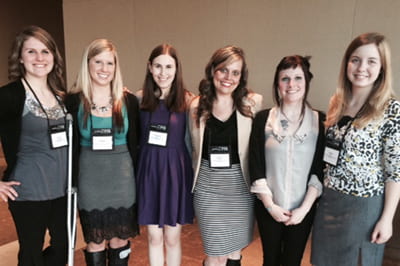Undergraduate researchers honored and recognized
 The experience is worth celebrating, but so is the recognition.
The experience is worth celebrating, but so is the recognition.
A number of UW-Green Bay undergraduates had a fantastic opportunity to participate in graduate-level research this year and were honored among the winners of the outstanding presentation awards at the 14th Annual UW-System Symposium for Undergraduate Research and Creative Activity.
Their research and presentation was one of 16 finalists selected from among 400 presentations representing undergraduate research from across the UW System.
Their presentation — “Phoenix GPS: A Wholistic College Transition Approach for Underrepresented Students” — reports on the year-one results of an intensive, year-long enrichment program for first year students at UW-Green Bay. Team members were Hannah Blum, Ashley Grant, Jordan Grapentine, Sarah Londo and Alex Wilson. Serving as their mentor was Denise Bartell, UWGB professor of Human Development.
“These students are a shining example of the value of undergraduate research experience for students from all majors,” said Bartell. “Despite coming into the project with very different levels of prior research experience, all developed graduate-level research and group work skills, had the opportunity to present at a national professional conference, and are currently working with me on a manuscript for publication of this data.”
Like her fellow student researchers, Alex Wilson served as a peer mentor in the program. She said the new challenge helped her to grow in ways unexpected: “I came to the realization that the project had a positive effect on my attitude and academics, and that I now place a greater perspective on empathy.”
“I wasn’t sure what to expect, but after the first semester, I found that I was providing to students what I haven’t always had in my life,” she said. “As a low income, first-generation college student, I understand that there are different barriers for every student. Providing opportunities for first-year students to succeed, despite the barriers, became something that I believe in. The types of experiences that the GPS students are having during their first year acts as an equalizer. Our data shows that many of the opportunities that we provide, such as tutoring, relationship building and service learning will create a learning environment that a student is more likely to want to stay in.”
The Gateways to Phirst Year Success (GPS) program provides historically underrepresented students with an engaging learning community experience, a network of mentors, and opportunities to develop academic agency and connections to campus and community.
GPS students earned significantly higher GPA’s, engaged in high impact experiences at higher rates, and were retained at significantly higher rates than similarly situated students who did not participate in GPS, and these results were strongest for students of color.
Underrepresented students who participate in GPS are 17.6% more likely to be retained at UWGB into year two (92.2% vs. 74.6%) and 13.1% more likely to be retained through the end of the second year (81.3% vs. 68.2%), as compared to underrepresented students who don’t participate in GPS.
Underrepresented (UR) GPS students earn significantly higher GPA’s than other underrepresented students in the first year (3.07 vs. 2.74), are significantly more likely to have declared a major (60.9% vs. 49.0%), and report participating in almost twice the number of high impact experiences during their first year (5.4 vs. 3.0). They are also significantly more likely to utilize campus resources in their first year when they need help, and participate in significantly more co-curricular activities, as compared to other UR students.
The GPS program also eliminates the equity gap for UR students in UWGB’s Human Biology 102 course — GPS students performed as well as represented students in this course.
Researching and quantifying the data was only one step in the process for the student researchers. Presenting their data to larger audiences presented a learning curve as well.
“The first few times we presented, we relied heavily on our peer mentor to paint a picture, but we’ve all gotten really comfortable with the numbers and data collection,” Wilson said. “The statistics demonstrate the successes that we saw during the time spent with students.”
Wilson also found that the lessons she learned translated well to outside the project… even outside the University.
“I talk about this program quite a bit,” she said. “The challenges I experienced as a peer mentor come up regularly in my work environment and I have a better idea how to manage. The knowledge I’ve gained as a research assistant is incredibly valuable. It was unexpected, but the growth I’ve witnessed through involvement has been obvious and important in my everyday life.”
Bartell said the program speaks volumes about the power of students’ commitment to helping others maximize their success in college.
“This group of research students represent a diverse set of majors, from Human Development to Spanish to Human Biology,” says Bartell. “They all chose to participate in the research project in order to continue their service to the University and to the underrepresented first-year students who are served by the GPS Program.”
(Pictured in the photo at the top: From left to right, Jordan Grapentine, Ashley Grant, Hannah Blum, Prof. Denise Bartell, Alex Wilson and Sarah Londo at the National Resource Center’s First-Year Experience Conference in Dallas, February 2015)


